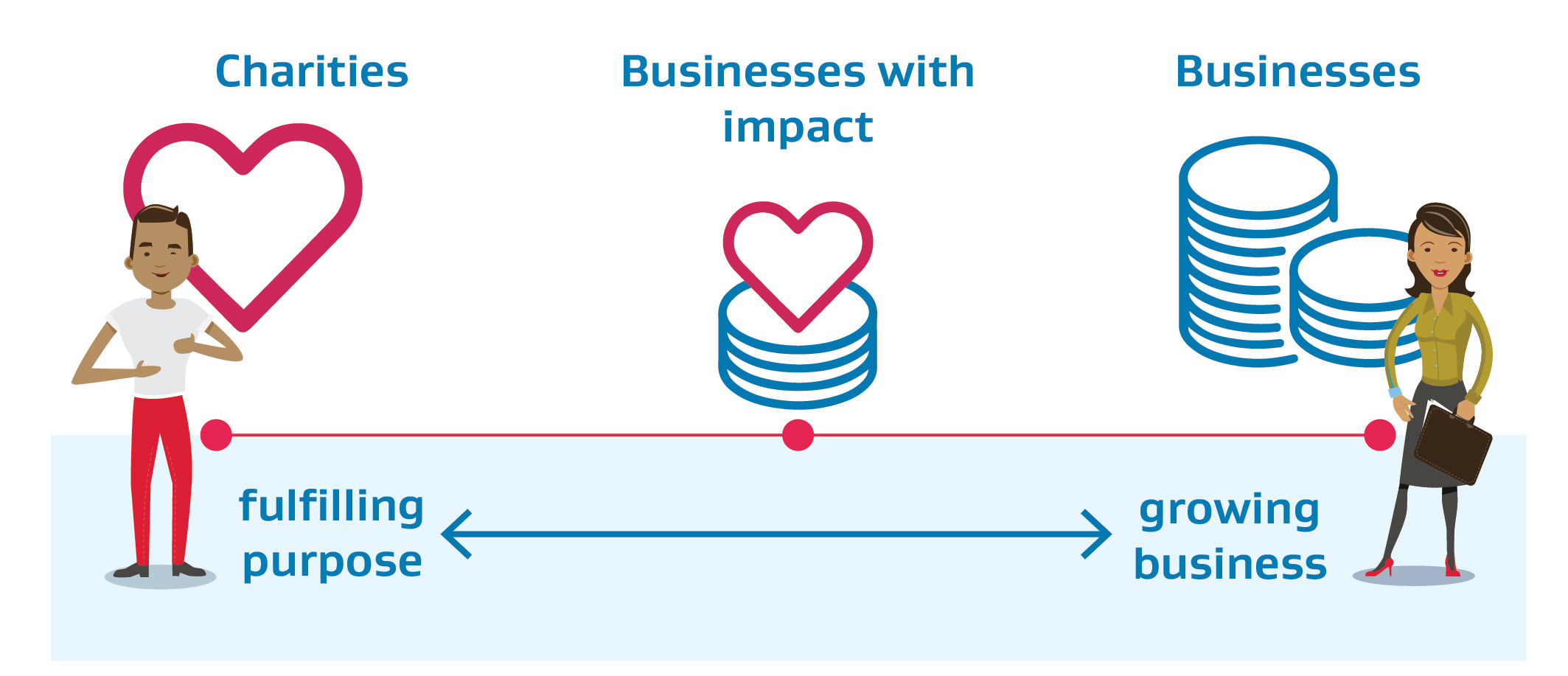
Making a difference with your purpose-led business
Keen to help solve problems in your community or your environment? With a clear purpose and a clear plan, your business can be a force for good. Explore the many ways you can help, whether you’re starting a new business or changing the focus of your current business.
You really can make money and make a difference at the same time. Find out how to begin.
Balancing purpose and profit
Making a difference with your business is all about balancing purpose and profit. First, identify a social or environmental problem you want to help solve. Then build a business that can make money in the long term. With a clear purpose and healthy cash flow, you’ll be set to make a lasting impact.
Every action counts
No business is too small to make a difference. Governments can’t fix every issue, and charities can’t either. Businesses that do good are an important part of helping solve life’s many problems, from poverty to discrimination to climate change. Your efforts will likely support the efforts of many others.
Commitment matters
To have a lasting impact, you’ll need commitment to both purpose and profit. The two might be closely matched, but they don’t have to be. For example, you might run a cafe that gives away some meals to people who don’t have enough to eat (closely matched). Or you might sell shoes but donate some profits to planting trees (not matched at all). Whatever you choose, make sure you really care about both. If you’re genuine, your customers will notice and support you more. Which means you can keep making a difference in the long term.
How you’re set up is key
Typically, businesses that do good make at least half their revenue from selling goods or services. They may also seek income from other sources, such as donations, grants, sponsorships or investment.
Think about where you might fit on the spectrum below. You’ll probably be somewhere between a charity that’s fully invested in purpose and a business that’s fully invested in growth.

Businesses that make a difference can be described in many ways.
You might hear the terms ‘purpose-led business’, ‘social enterprise’, ‘impact enterprise’, ‘social impact business’ or ‘community enterprise’. These can mean slightly different things, but they all describe the key idea of making a difference through doing business. You can use whichever term best describes you.
Many ways to do good
You can make a difference with your business in many ways. The method you choose depends on where you start from and what drives you. Here are a few to consider.
Donate some of your profits
This is most like a traditional business, but you make money to donate, rather than to grow. You partner with a charity or not-for-profit organisation and give them a percentage of whatever you make. For example, you might run a bookshop and donate your profits to a cancer charity.
Revive your environment or community
Some businesses create positive change directly through their main activity, such as planting trees, training disadvantaged youth or providing jobs for refugees. For example, you might make soaps and shampoos, and employ people with learning disabilities to label and package everything.
Sell some, give some
Some products or services can turn a profit and also do direct good in the community. This means you can both sell some and give some away. For example, you might bake bread to sell to supermarkets and also to give to soup kitchens.
Make from waste
To reduce what goes to landfill, you can turn others’ waste into a new product. For example, you might partner with a demolition company to salvage waste materials, then craft beautiful new furniture to sell.
Do something totally new
Sometimes a fresh new idea completely changes how people do things. New websites or software, in particular, can have a big impact quickly. For example, you might create a new app that helps wheelchair users find accessible transport more easily.

Case study: Computers for kids
Leilani has a successful business fixing people’s personal computers. She drives around Christchurch to customers’ houses, troubleshooting issues and doing routine maintenance. She also has a contract to fix computers at a local school.
Get inspired!
Read about other businesses who are making a positive difference.
Social Enterprise Stories(external link) — The Impact Initiative
“Purpose-led businesses can spark change in the world.”
Jessica Palalagi, Capability Enabler at Ākina Foundation
Do your research
Before you can start making a difference, you’ll need to check if your basic idea is workable. Lots of other businesses, organisations and charities exist, and some will have similar goals to you. Research who’s addressing the problem you want to solve, plus who’s making money in the way you want to. Will you complement these efforts, or compete with them?
Research the problem you want to solve
List all the New Zealand businesses, organisations and charities who care about the problem. Plus, look for events and forums (in-person or online) that discuss the problem. Talk to as many like-minded people as possible. Ask questions! Find out what’s getting done and what’s not. Try to identify gaps you could fill.
Research who’s making money in the way you want to
List other businesses offering similar products or services. Ask yourself:
- How many exist? Can you see room for you too?
- What will you offer that’s different or better?
- Why would customers buy from you rather than from others?
For example, will your products or services be cheaper? Or will you offer superior quality or features? Or will you offer more varieties or customise each sale?
How we work with partners
We work with experts in the public and private sector to get best practice advice to help small businesses succeed. If you are interested in partnering with us to contribute content, please get in touch.


